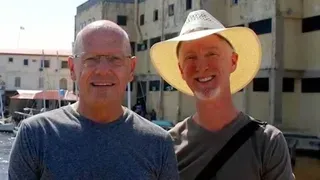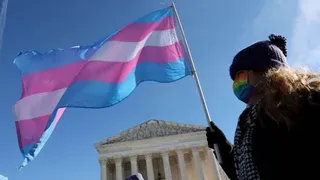April 19, 2008
IBM, Verizon partner with GLASS on GED program
Michael Wood READ TIME: 4 MIN.
Many of the youth who access services at JRI Health's Boston GLASS (Gay and Lesbian Adolescent Social Services), which primarily serves LGBT youth of color, face multiple barriers to completing their education. Constance Robinson, GLASS's crisis and resource specialist, said that many of the youth who turn up at the Mass. Avenue center have dropped out of high school after being subjected to anti-gay taunts and/or physical assaults. GED programs, said Robinson, sometimes can be just as hostile towards LGBT students.
That's why GLASS launched its own GED program two years ago.
"[W]e decided to create our own where we could have our young people feel comfortable in a setting that they knew they weren't going to be harassed in, that they could really devote their time to studying rather than having to deal with verbal and physical harassment in schools," Robinson explained.
GLASS's GED program got a major boost April 11, receiving a $75,000 grant from the Verizon Foundation and ten new computers from IBM. The grant and the new machines will allow GLASS to hire a dedicated GED instructor and make greater use of Verizon's education resource portal, Thinkfinity.org, which includes free online K-12 lesson plans and interactive tools on a wide range of academic subjects.
During the check presentation ceremony April 11 at Boston GLASS, Douglas Brooks, vice president of health services for JRI, credited MassEquality board president David Wilson with connecting JRI and Wilson's friend, Verizon Foundation President Patrick Gaston, to discuss potential collaborations. During a meeting with GLASS staff Brooks said that Robinson told Gaston that her GED program was already making use of lesson plans from Thinkfinity, which at the time was called Marco Polo. Gaston invited JRI to submit a proposal to Verizon to fund further work with Thinkfinity. Brooks said GLASS would be the first non-academic organization making widespread use of Thinkfinity in the classroom.
"This is the first time that it's been used in a non-academic setting, and we are very excited to have that happen here," said Brooks. He said GLASS will be evaluating the program vigorously to see which approaches work, allowing Verizon to potentially replicate the GED program in other youth service settings down the line.
Gaston praised GLASS and JRI for adapting Thinkfinity's resources for use outside the classroom, and he said Verizon strongly supported GLASS's mission of empowering LGBT young people to access an education.
"It's very important that the GLBT community and the youth have the resources they need," said Gaston.
Robinson said she first began using Thinkfinity, a searchable web portal featuring interactive lessons in a variety of subject areas, after scouring the web for materials to use in the classroom.
"There were certain students in the GED program who needed specific help in specific areas. So I am going through looking for programs, maybe something interactive, and came across something called Marco Polo, which has just a plethora of exercises and interactive stuff that people could do, and you could go from kindergarten all the way up through 12th grade," she said.
Robinson said the interactive nature of the lessons on Thinkfinity has helped keep the youth engaged.
"Anything that has to do with technology is more of a draw. Anything that's interactive, rather than somebody just speaking at someone, is easier for them to work with and get the hang of," Robinson said.
Carolina Martinez, a 20-year-old who recently got her diploma through the GED program, said that the Thinkfinity lessons helped her get a broader understanding of much of the material, and she said it strengthened her math skills in particular. She said attended the GED program on and off for about a year, and she said with her diploma she hopes to attend college and become a nurse midwife. Martinez said she has been coming to GLASS since she was 16, and she said she left school not because of anti-gay harassment but because she has been living on her own and supporting herself for reasons unrelated to her sexual orientation.
"I had to work for myself. I had to buy everything for myself, so work was more important than school, even though school was more important. Coming here, I got it at my schedule, I got to work, and whenever I needed help for homework I came here. The tutor worked through my schedule, basically, which was great," said Martinez.
Robinson said over the past two years the GED class, which meets for two weekly four-hour sessions, has had a maximum of ten students per class, and four students have successfully graduated the program. With the funding from Verizon and the computers from IBM, Robinson said the class should be able to expand to between 10 and 15 students. GLASS is currently working with the Boston Day and Evening Academy to hire a dedicated GED instructor, and once that employee is in place Robinson said GLASS will begin offering GED classes four or five days per week.
Robinson said with more computers GLASS will be able to make greater use of Thinkfinity, which she said will allow the instructor to customize lessons for each student's education level. The interactive lessons, which are created by organizations like the National Endowment for the Humanities, the National Council of Teachers of Mathematics, the American Association for the Advancement of Science, and other nationally recognized sources, are customizable by grade level, allowing her to focus on a given subject area with the whole GED class but gear each student's lesson to his or her level of understanding.
"You could have it be used by someone who maybe had a seventh to eighth grade understanding of something, someone that had a ninth, tenth, eleventh or twelfth grade understanding. You can kind of tailor it," said Robinson. "Therefore everybody's working on the same program, but we're meeting them where we're at. So it relieves stigma that maybe somebody is better at something than someone else was. Everybody can do the same thing."
Michael Wood is a contributor and Editorial Assistant for EDGE Publications.







